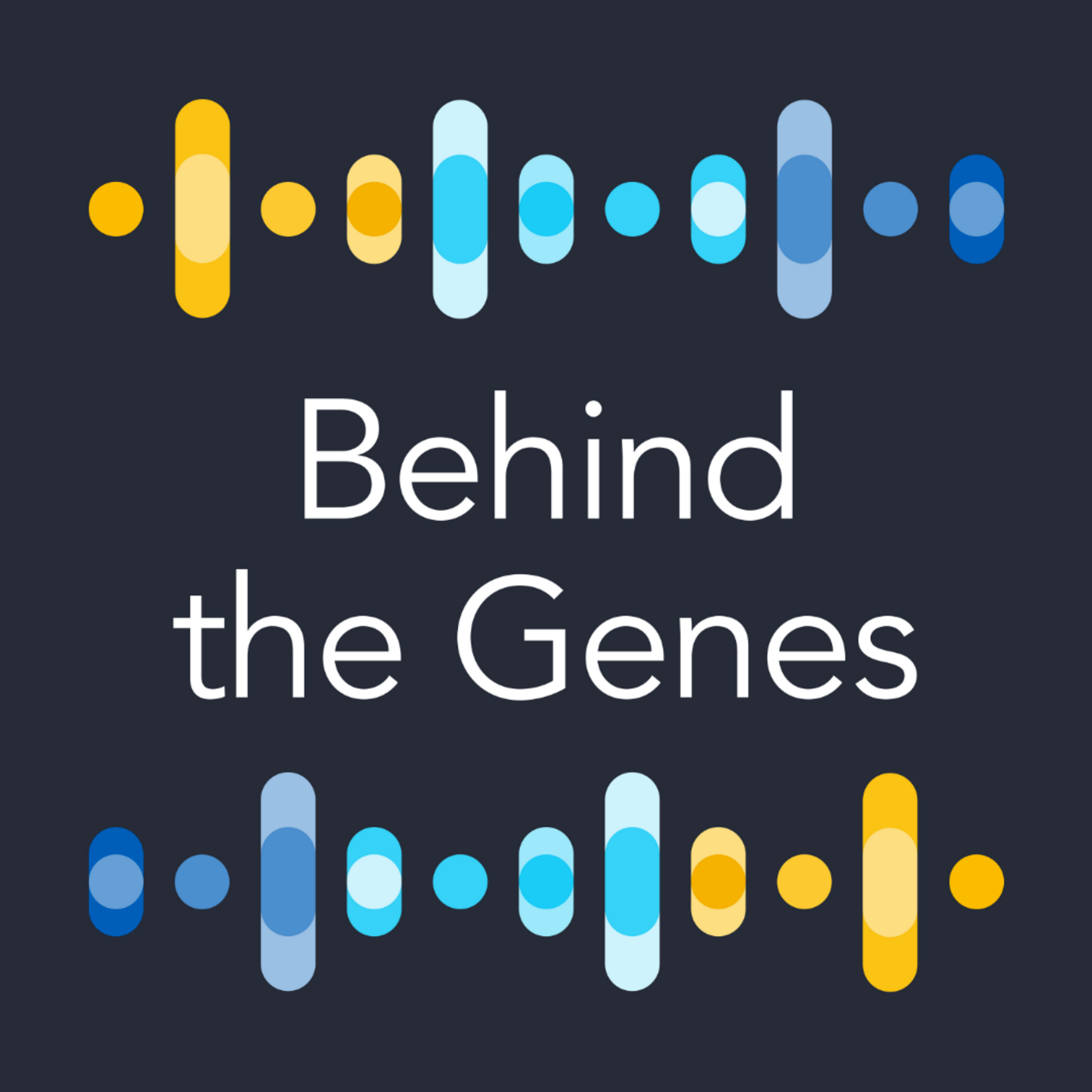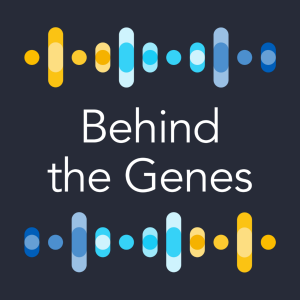
We are Genomics England and our vision is to create a world where everyone benefits from genomic healthcare. Introducing our refreshed podcast identity: Behind the Genes, previously known as The G Word. Join us every fortnight, where we cover everything from the latest in cutting-edge research to real-life stories from those affected by rare conditions and cancer. With thoughtful conversations, we take you behind the science. You can also tune in to our Genomics 101 explainer series which breaks down complex terms in under 10 minutes.
We are Genomics England and our vision is to create a world where everyone benefits from genomic healthcare. Introducing our refreshed podcast identity: Behind the Genes, previously known as The G Word. Join us every fortnight, where we cover everything from the latest in cutting-edge research to real-life stories from those affected by rare conditions and cancer. With thoughtful conversations, we take you behind the science. You can also tune in to our Genomics 101 explainer series which breaks down complex terms in under 10 minutes.
Episodes

Wednesday Sep 28, 2022
Professor Matthew Hurles: The Sherlock Holmes moment
Wednesday Sep 28, 2022
Wednesday Sep 28, 2022
The genome itself was the beginning of a whole technological revolution. Matt and Chris talk about taking on the challenge, searching for the needle in the haystack, and making it work at scale! Join Chris and population geneticist Prof Matthew Hurles this week as they delve into the genetic detective work and the future of research while engaging the research and participant community. If you're a student wanting to get into the field, Matt gives his take on how to go about it.
You can find our transcript here – https://files.genomicsengland.co.uk/documents/Podcast-transcripts/Matthew-Hurles.docx.
“The reference datasets of normal population variation in individuals of African ancestry are just smaller, and therefore less powerful than the ones of European ancestry. What we really need to do is enrich those African ancestry population datasets, that's something we really can hit on. I think that's a real global challenge."
Prof Matt Hurles is Head of Human Genetics at the Wellcome Sanger Institute and Senior Group Leader of The Hurles Group. He is also the founder of Congenica and an honorary professor of Human Genetics and Genomics at the University of Cambridge. He leads the Deciphering Developmental Disorders (DDD) Study and the Prenatal Assessment of Genomes and Exomes (PAGE) Study. He also led the DECIPHER initiative that is enabling rare disease patients to share anonymised genetic and clinical data globally.

Wednesday Sep 21, 2022
Bettina Lundgren: CEO of the Danish National Genome Centre
Wednesday Sep 21, 2022
Wednesday Sep 21, 2022
“I like ambitious visions, I like try to break the codes in order to get something to work to get a result. But on top of that, I want to make a change for the patient today, and a change for the future patients. And actually to use the knowledge and technology in order to change that to make a better healthcare system to make a better life for each patient today, each citizen.”
Today on The G Word, Chris Wigley, CEO of Genomics England is joined by Bettina Lundgren, CEO of the Danish National Genome Centre.
They discuss Bettina's career, the importance of translating and understanding colleagues, and genome sequencing to benefit patients and to help find better treatments and cures.

Wednesday Sep 07, 2022
Julia Vitarello: Mila’s story - from Mila to millions
Wednesday Sep 07, 2022
Wednesday Sep 07, 2022
"We took a look and we perform whole genome sequencing of Mila, her mother, her father, as well as her little brother. And we looked for something that might have been missed in those dark regions of the genome. And we found something quite unusual..."
In Todays Episode, Dr Richard Scott, Chief Medical Officer of Genomics England is joined by Julia Vitarello, the mother of Mila, a young girl who was diagnosed with Battens Disease, and Dr Tim Yu, the doctor who designed a medicine just for her.
We'll be hearing Mila's story and how Julia and Tim hope to help many more families access treatments for their children -- as they put it, from Mila to millions.

Wednesday Aug 31, 2022
Reed Jobs: Philanthropy and venture funding the future of cancer care
Wednesday Aug 31, 2022
Wednesday Aug 31, 2022
"I was driven by a personal desire to see this problem solved."
On Today's Episode, Parker Moss, our Chief Ecosystems and Partnership Officer, is joined with Reed Jobs, the Managing Director of Health at Emerson Collective, a for-profit organisation focused on education, immigration reform, the environment, media and journalism, and health. Reed Jobs leads Emerson's team in the health care space. With a sole focus on oncology, his team accelerates the discovery and translation of cancer research to best improve and empower the lives of patients.
They discuss venture capitol, venture philanthropy and philanthropy funding in cancer. They also discuss the origin story of Reed's career, how his father's (Steve Jobs) diagnosis launched him into his research and why.

Wednesday Aug 24, 2022
Rebecca Middleton: The patient’s voice
Wednesday Aug 24, 2022
Wednesday Aug 24, 2022
"I know the power of a word, I know the power of a story, I know the power of a phrase, and language really is so meaningful and so valuable. […] Every data point has a face, there is a person there, it's not just a number, it's not just a code. Principle number two, treat people as you would like to be treated."
On today's episode, Chris Wigley is joined by Rebecca Middleton, Vice Chair of the Participant Panel and founder of Hereditary Brain Aneurysm Support (HBA Support). They discuss Rebecca's clinical and genetic journey, her participation in the 100,000 genome project and what that meant for her. They also discuss the difficulty of having a rare disease, how the lack of information can cause great loneliness and uncertainty and why Rebecca opened HBA Support in response.
Having lost family to brain aneurysms, and having undergone surgery for an aneurysm herself, Rebecca recently founded HBA Support and is establishing a patient-centred organisation to support patients and families living with familial brain aneurysm syndrome. For more information click here: https://hbasupport.org/

Wednesday Aug 17, 2022
Georgia Whitton: Changing course
Wednesday Aug 17, 2022
Wednesday Aug 17, 2022
"Getting your genetic information isn't just [of] your own, it belongs to your ancestry too."
On today's episode of The G Word, Chris Wigley, our CEO is joined by Georgia Whitton, the Senior Genomic Data Scientist at the Wellcome Sanger Institute. She is also a broadcaster on YouTube. She hosts 'Genomics with Georgia', and is bringing new talent into the tech and science field through volunteering with Code First Girls and many other great activities.
From aspiring actress to senior genomic data scientist, Georgia walks us through her genomic journey, starting with her A-level choices to deciding which variant of COVID-19 was infecting the UK. Chris and Georgia also discuss her current work in genomics surveillance and amplicon sequencing of malaria.

Wednesday Aug 10, 2022
Professor Martin Levermore: HDR UK’s Black Internship Programme
Wednesday Aug 10, 2022
Wednesday Aug 10, 2022
"It's so important to have companies that represent [black] people. Because if you see people like you, who look like you, you're gonna feel like they have your best intentions."
On Today's episode of The G Word, Sophia, the Design Researcher for our Diverse Data team, is joined by Professor Martin Levermore, hub member and pioneer of the programme, alongside two of the programme's interns, Samuel and Mbasan.
They discuss the need for black talents in genomics and how the Black Internship Programme is breaking barriers to enable the diversification process. They also discuss the importance of representation when asking for sensitive information from unrepresented communities, breaking the distrust to gain a broader insight into our genomic data.

Wednesday Aug 03, 2022
Lucy McKay: Opening the door to rare diseases
Wednesday Aug 03, 2022
Wednesday Aug 03, 2022
"Every disease is a rare disease because it's a disease in you, and it's interacting with you. So, this idea that there are rare diseases, and there are common diseases, [is] kind of nonsense because everything is rare in the context of a given human being."
On today's episode of The G Word, our CEO, Chris Wigley, is joined by Dr Lucy McKay, CEO and founder of Medics for Rare Diseases. Medics for Rare Diseases is a grassroots charity created to change the attitude towards rare diseases and changing the ground for people with rare diseases.
Together, they discuss Lucy's genomics background, delving into her personal relationship to rare disease through her brother and how a conversation at the dinner table with her parents opened the door to many opportunities. They also cover the impact of using terminology such as 'disease' and 'rare' towards patients and in classrooms.

Wednesday Jul 27, 2022
Professor Sir Mark Caulfield: The predecessor’s view
Wednesday Jul 27, 2022
Wednesday Jul 27, 2022
"In cancer, it's been more challenging, because we had to get a community that hadn't really worked on the scale of data at all, to come to terms with that."
On today's episode, Matt Brown, our Chief Scientific Officer at Genomics England is joined by professor Sir Mark Caulfield, one of the founding employees of Genomics England and predecessor to Matt Brown as Chief Scientific Officer.
Today, they'll be discussing Mark's recollections of his time as Chief Scientific Officer of Genomics England, and his thoughts about pharmacogenomics' future.

Wednesday Jul 20, 2022
Data science: The need for health equity
Wednesday Jul 20, 2022
Wednesday Jul 20, 2022
"Biomedical datasets are biased towards Western white rich men typically. This means that historically underserved groups are less likely to be represented in the data."
Today on The G Word, Maxine Mackintosh, the Programme Lead for Diverse Data at Genomics England, is joined by Alisha Davies from Public Health Wales and the Alan Turing Institute, and Brieuc Lehmann, from UCL, and both of whom are involved in the data science for Health Equity community.
They discuss the role of data and data science in promoting and improving health equity. They also talk about the lack of representation and diversity in genome research and how and why this must change.
